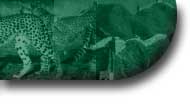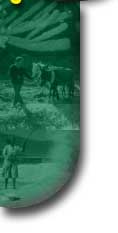- Ecotourism -
Travel to an Organic Farm
with Horses in Poland
(Any time you see a link, you can click it for more
information on that word or topic)
A Man and His Horses
My name is Jerzy Trawinski. I was born in 1962 and spent my childhood
near the Cistercian abbey in Henrykow in Southwestern Poland. Next to
the abbey there was an agricultural school where my parents worked as
teachers. The school had its own horseback riding club. I was ten when
I first rode a horse together with my brothers.
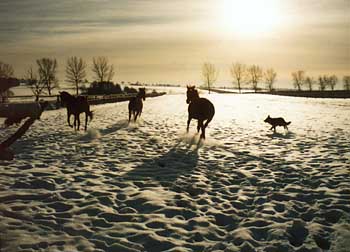 Horse
riding became our passion. I was riding a full-blooded gelded horse that
had been withdrawn from the races. We took part in competitions and shows
and spent our free time at the stable. This lasted for four years, until
my favorite horse fell ill and died. I didn't ride a horse for 18 years
after that. It was during those four years that I developed my love for
horses and horse riding that is still one of my great passions today. Horse
riding became our passion. I was riding a full-blooded gelded horse that
had been withdrawn from the races. We took part in competitions and shows
and spent our free time at the stable. This lasted for four years, until
my favorite horse fell ill and died. I didn't ride a horse for 18 years
after that. It was during those four years that I developed my love for
horses and horse riding that is still one of my great passions today.
When I was 14 I left my family and started studying at a gardening school.
I wasn't thinking seriously about my education then and, because of that,
I didn't finish. Later, I lived and worked in different cities and towns
in Poland. The only lasting benefit I retained from school is Kasia, the
girl I shared my desk with, who is now my wife.
In order to combine my love for horses with the simple harmony of natural
life, I decided to buy a farm and move to the country. For a few months
I was searching for a good place which would be in a picturesque area
and have enough buildings for horses and enough land. Finally, in 1987,
after three months of searching, I succeeded and found an old and broken-down
farm in Nowina, 60 km from Wroclaw in southwest Poland. 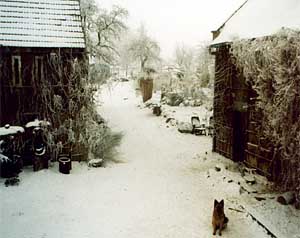 It
has 3 buildings and 13 hectares of land. Nowina is a small secluded village
located in the Strzelin hills with picturesque forests surrounded by rolling
fields. It
has 3 buildings and 13 hectares of land. Nowina is a small secluded village
located in the Strzelin hills with picturesque forests surrounded by rolling
fields.
The farmhouse was very broken down and the garden was a mess. But the
barns for horses were in good condition. Our daughter, Ania, was born
here. I designed a garden using the artistic part of my soul. I created
different designs for planting trees, flowers and making small ponds.
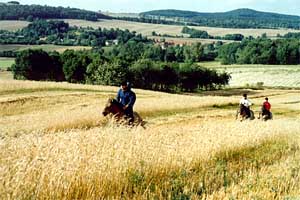 I
created all this in such a way as to not disturb nature while bringing
about greater biodiversity. Apart from our big vegetable garden, we raise
black currants organically. We sell part of the currents straight from
the plants to our visitors. From the rest, Kasia prepares her homemade
jams. We slowly renovated the farmhouse, keeping the old style with its
secrets. I
created all this in such a way as to not disturb nature while bringing
about greater biodiversity. Apart from our big vegetable garden, we raise
black currants organically. We sell part of the currents straight from
the plants to our visitors. From the rest, Kasia prepares her homemade
jams. We slowly renovated the farmhouse, keeping the old style with its
secrets.
After seven years of different activities we were ready to make a childhood
dream come true -- to raise horses of our own. The first horse we bought
was a full-blooded mare chosen by Kasia. We already had dogs and cats,
goats, hens and turkeys. We bought just two horses. The next year we had
our first delivery: a lovely colt. Every year new animals were born. Countryside
living according to the rhythm of nature became our passion.
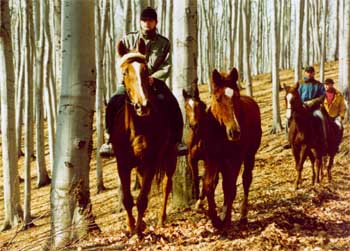
Another of my passions is for travelling. I have had the happiness of
visiting Africa three times. But, while visiting New York, I was stupefied
at the sight of a street seller cutting a chicken into pieces with a plastic
knife. I wasn't able to eat this chicken. And on one farm I visited, in
front of my eyes I saw hens and chickens living compressed into cages,
with food carried to them on a conveyor belt. I understood then how important
it is to counteract this madness and have done what I can to do so by
providing an example with my own farm.
When the farmhouse and garden were repaired, Jadwiga Lopata appeared
with her idea about eco-tourism. Jadwiga is head of the European Centre
for Ecological Agriculture and Tourism-Poland (ECEAT-Poland). Its mission
is to use ecological tourism to organic farms as a tool to help small
farmers make a sometimes difficult transition from conventional agriculture
to ecological agriculture. They also encourage humane treatment of animals
and many conservation and preservation efforts to help people in the farming
regions as well as on the farms themselves.
What's the Problem?
Jadwiga told me:
"More than a million small Polish farms (less than 7 hectares) are threatened
by the coming entry of Poland to the European Union, which favors large
conventional farms and methods which are harmful to health and the environment,
the traditional landscape and biodiversity, and which would uproot small
farmers and create further unemployment, migration to unhealthy, overcrowded
cities, and destruction of the rural culture and way of life."
"The mission of the European Centre for Ecological Agriculture and Tourism-Poland
(ECEAT-Poland) is to use ecological tourism to organic farms as a tool
to help small farmers make a sometimes difficult transition from conventional
agriculture to ecological agriculture. In this way the farmers benefit
financially while environmentally sound practices are spread, and the
natural landscape, biodiversity and local culture and traditions are protected
and shared with visitors. By working in a cooperative and ecological way
small Polish farmers will be able to protect their livelihoods and their
traditional way of life in a coming period of difficult economic and social
transformation."
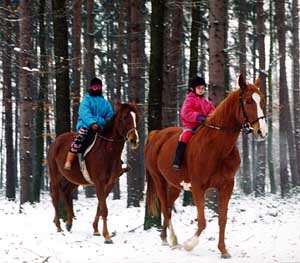 I
found that it was a great idea and just what I needed. Jadwiga made me
aware that I have many things to offer to other people. And I realized
that I should share my lifestyle with others, in the hope that they will
be inspired in this direction. I realized that we need many people with
awaked ecological awareness, who will take care of the places where they
are living, and at the same time will also fulfill their dreams. So, in
1997, we decided to cooperate with ECEAT-Poland. I
found that it was a great idea and just what I needed. Jadwiga made me
aware that I have many things to offer to other people. And I realized
that I should share my lifestyle with others, in the hope that they will
be inspired in this direction. I realized that we need many people with
awaked ecological awareness, who will take care of the places where they
are living, and at the same time will also fulfill their dreams. So, in
1997, we decided to cooperate with ECEAT-Poland.
Conversion to Eco-tourism:
At the beginning of our cooperation, ECEAT brought the idea of eco-tourism
into our lives and we gave our farm an eco-tourist profile. During the
meetings organized by ECEAT, we learned how to change our farm into an
ecological farm. We adapted the barn's attic for visitors using natural
wood, brought in light through carefully placed, well-insulated skylights
we oriented so they would keep our guests in touch with our beautiful
surroundings. For campers, we adapted an old storeroom for toilets and
showers. And we bought a few more horses. Today we have 14 beautiful,
well-trained horses.
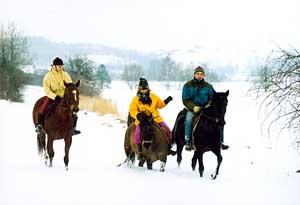 After
one year of having visitors, I was even more convinced that this was a
very good idea for me and my family. The next step was to adapt the old
buildings to new technology. We added an ecological cleaning system, an
efficient oil heating system, and an inside water system which is designed
to conserve water. I learned to conserve water because there is very little
good water in Poland. Also, on our farm we introduced an ecological wastewater
system called TURBOJET. It's a Belgian technology that provides mechanical
oxygenation of waste containers, which accelerates the biological processes. After
one year of having visitors, I was even more convinced that this was a
very good idea for me and my family. The next step was to adapt the old
buildings to new technology. We added an ecological cleaning system, an
efficient oil heating system, and an inside water system which is designed
to conserve water. I learned to conserve water because there is very little
good water in Poland. Also, on our farm we introduced an ecological wastewater
system called TURBOJET. It's a Belgian technology that provides mechanical
oxygenation of waste containers, which accelerates the biological processes.
To our guests we offer horseback riding tours in the picturesque and
historical Polish countryside, homemade food, fruit and vegetables from
our ecological garden, and a homey atmosphere. We take them on horseback
for trips to the old Cistercian monastery in Henrykow which is now a UNESCO
monument, to a sanctuary of old beech trees where we can ride for many
kilometers on well-tended trails, to scenic towers and old mills. Riding
alongside a field, we can reach up and pick my friend's apples, pears
and plums.
I design all the experiences to suit the interests and abilities of
the riders and take riders together whose abilities are similar so they
can all enjoy the experience. I love giving our guests these chances to
enjoy our horses and our part of the world. Due to ECEAT, many foreign
and Polish guests are now visiting us. During the first year we had 60
visitors from Poland and Holland. In the second year we had over 100 visitors
from Poland and over 50 visitors from other countries.
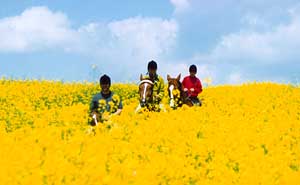 Our
guests also have the unique opportunity to stay in a traditional village,
that would already be a historical relic in many countries, but is still
inhabited. The inhabitants of our village are mostly elderly people. They
run their farms traditionally. They hadn't believed that it was possible
to attract tourists here. However, now they are convinced, and they are
delighted to sell our visitors eggs, milk and other farm products. Some
of our villagers have planted decorative plants in front of their houses
for the first time in their lives. They now feel that we have something
to be proud of, and that the exodus of our village's young people to the
city doesn't have to be their only alternative. Our
guests also have the unique opportunity to stay in a traditional village,
that would already be a historical relic in many countries, but is still
inhabited. The inhabitants of our village are mostly elderly people. They
run their farms traditionally. They hadn't believed that it was possible
to attract tourists here. However, now they are convinced, and they are
delighted to sell our visitors eggs, milk and other farm products. Some
of our villagers have planted decorative plants in front of their houses
for the first time in their lives. They now feel that we have something
to be proud of, and that the exodus of our village's young people to the
city doesn't have to be their only alternative.
A look to the Future:
We hope that in time some other villagers will join the ECEAT project.
There are many people who are searching for places like mine to visit.
They are attracted to the simple lifestyle in harmony with nature and
have my passion for horses. I love to teach people horseback riding and
to teach them all the secrets about how to love horses. I also like the
idea of small-scale tourism because this way I have real pleasure from
my work, and I do not need to exploit horses. I love my horses, my dogs
and my sculptures in my garden. And in everything I am doing I have my
wife's companionship.
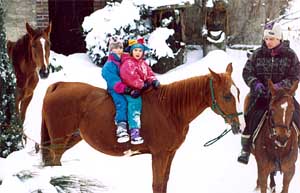 While
I want to teach other people to do the same as I have, I never try to
convince my neighbors by talking, but only by practical example. So I
am happy to observe that my neighbors have started to treat their animals
in a better way. They take better care about their dogs, and have learned
to give more freedom to their horses when the horses are not working.
And my neighbors also have started to renovate their old houses and care
more about local traditions. We believe that by attracting visitors to
the village and by propagating the idea of organic food we are acting
against big companies which degrade the natural environment and which
support animal breeding in meat factories, and in this way we help Mother
Earth. While
I want to teach other people to do the same as I have, I never try to
convince my neighbors by talking, but only by practical example. So I
am happy to observe that my neighbors have started to treat their animals
in a better way. They take better care about their dogs, and have learned
to give more freedom to their horses when the horses are not working.
And my neighbors also have started to renovate their old houses and care
more about local traditions. We believe that by attracting visitors to
the village and by propagating the idea of organic food we are acting
against big companies which degrade the natural environment and which
support animal breeding in meat factories, and in this way we help Mother
Earth.
Contacts:
Jurek Trawinski
Nowina 657-210 Henrykow
Poland
Tel: (48) 090 344 126
ECEAT-Poland:
European Centre for Ecological and Agricultural Tourism-Poland
Telephone/Fax: 48-33-797114
email: Jadwiga@eceat-pl.most.org.pl
Related case study (on the main Solutions Site): Ecological
tourism to organic farms
|

